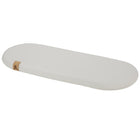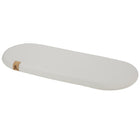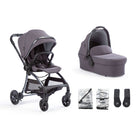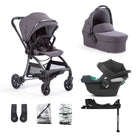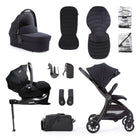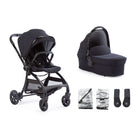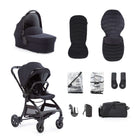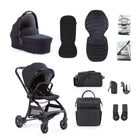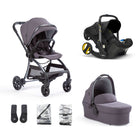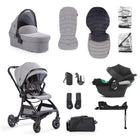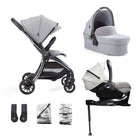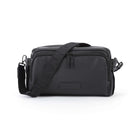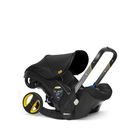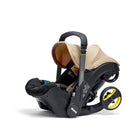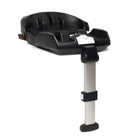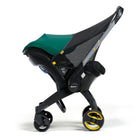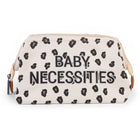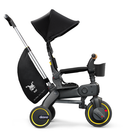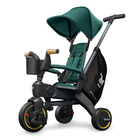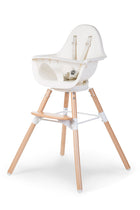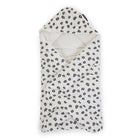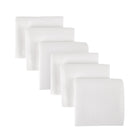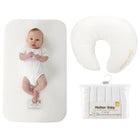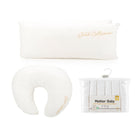Having a healthy, balanced diet during pregnancy is important for both you and your baby. By eating a varied diet, you can ensure that you’re getting the nutrients you both need to help your baby grow and develop.
Eat Well Guide
A healthy diet doesn’t necessarily mean cutting out all your favourite foods. But instead, changing the number of different foods you eat to achieve a varied diet. The NHS Eat Well Guide makes it easy to understand how much of what you eat should come from each food group.
Cooking a balanced, nutritional meal may be the last thing on your mind when pregnant. Especially during your first trimester, when you may be experiencing sickness or tiredness.
But not to worry, as you don’t have to achieve the right balance in every meal. The NHS states that you should aim to get the balance right over the course of the week.
Myth-busting
A common myth you’ll hear while pregnant is that you’re now ‘eating for two’. However, when you’re pregnant, you don’t need to have larger portions or extra food. The best way to ensure your baby is getting the essential nutrients they need to develop is by trying to achieve a healthy, balanced diet.
It's normal to have an increased appetite during your pregnancy. According to BabyCenter, the reason you feel hungrier is due to changes in your hormones. They explain that even though you may feel ravenous, you don’t actually need any extra calories. It’s only in the third trimester that you need an extra 200 calories a day.

Fruit and Vegetables
Fruit and vegetables are full of vitamins and minerals as well as fibre, which can help prevent constipation. They also release energy slowly, so you feel fuller for longer.
Therefore, you should eat at least 5 portions of fruit and vegetables a day. These can be in the form of fresh, canned or frozen fruit and vegetables. When shopping for canned fruit and vegetables, you should opt for those that are tinned, in natural juice or water, with no added salt or sugar.
Remember to always wash fresh fruit and vegetables.
For more information on what counts as one of your 5 A Day, visit the Eat Well guide.

Important Vitamins and Minerals in Pregnancy
A healthy, varied diet should help you get most of the vitamins and minerals you need during pregnancy. However, the NHS recommends pregnant women to take a folic acid supplement and a vitamin D supplement.
Folic Acid
Start taking folic acid as soon as you begin trying for a baby or as soon as you find out you're pregnant. The NHS advise you to take a folic acid supplement that contains 400 micrograms (mcg) every day until the end of your first trimester. It’s important to follow this advice as folic acid can prevent neural tube defects such as spina bifida.
Vitamin D
Vitamin D is essential for healthy bones and muscles. During autumn and winter (between October and early March), the lack of sunlight means we cannot make the vitamin D we need. Therefore, you should consider taking a daily vitamin D supplement containing 10mcg.
Vitamins You Should Avoid
During your pregnancy, you should avoid supplements and multivitamins containing vitamin A (retinol). Too much vitamin A can harm your baby’s development. This also includes liver products such as fish liver oil.
If you’re unsure or have any doubts about vitamins and supplements. We recommend speaking to a healthcare professional.
Food and Drink to Avoid During Pregnancy
There are certain food and drink you should avoid while you’re pregnant. Some are more obvious than others, like alcohol. But others may surprise you.
Below is a condensed list of food and drink you should avoid:
- Raw or undercooked meat
- Game meats such as partridge
- All types of pâte
- Liver and liver products
- Raw shellfish
- Shark
- Swordfish
- Marlin
- Unpasteurised milk and dairy products
- Mould-ripened soft cheeses (unless cooked until steaming hot)
- Soft blue cheeses (unless cooked until steaming hot)
- Soft goats’ cheese (unless cooked until steaming hot)
- Raw or undercooked eggs that aren’t British Lion eggs
- Alcohol
- More than 200 mg of caffeine per day
We suggest you ask your GP or midwife for a full list of food and drink you should avoid while pregnant.
A Happy, Healthy Pregnancy
The most important thing to remember during your pregnancy is to eat a variety of foods to help achieve a balanced diet. Healthy eating doesn’t have to feel like a chore.
Remember, you can still enjoy your favourite foods. But just keep in mind that if sugary food and drinks are your favourite treats. You need to have these less often and in small amounts.
For further advice and guidance, speak to your doctor or midwife. Before making any changes to your diet, make sure you speak to a healthcare professional.























